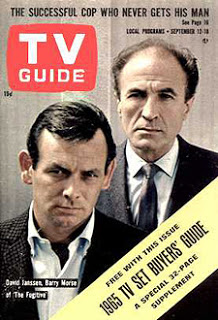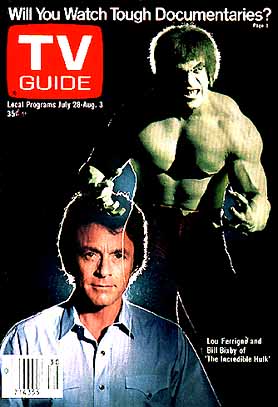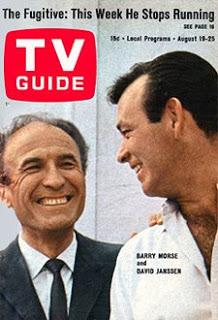Jean Valjean by Inspector Javert in Les Miserables,
Now stay with me here, this is about comics. I just got the complete series of:
The Fugitive, a QM Production starring David Janssen as Dr. Richard Kimble: an innocent victim of blind justice, falsely convicted for the murder of his wife … reprieved by fate when a train wreck freed him en route to the death house … freed him to hide in lonely desperation, to change his identity, to toil at many jobs … freed him to search for a one-armed man he saw leave the scene of the crime … freed him to run before the relentless pursuit of the police lieutenant obsessed with his capture.
As a kid the first thing I noticed about the Fugitive was how similar it was to another show, Route 66. Ever since Jack Kerouac went “On The Road” there seemed to be many movies and TV shows about people going town to town and never settling down. On Route 66, Buzz and Tod traveled across America, for reasons, as kid I could never figure out. They always got involved with the townspeople and always got involved in issues not meant for strangers. As soon as they figured everything out, they were “on the road” again. But whatever the issues were, we never really got to know Buzz and Tod, their history was a blank slate and, as such, the show never interested me except for one thing. This was an era where TV had “former” movies stars as guest stars and they were fun to see. They also had future movie stars, which makes shows like this fun to look back on.
There were also many shows, often detective or doctor shows, that took place in one town, but had the same feel to them. That is, the star of the show got involved totally with a family or a community, but moved on by the next week.
Quinn Martin got TV story-telling and up the ante with the Fugitive. Here, Richard Kimble, travelled from town to town, but had a reason. His back story was not thrown out in the first episode, but slowly came to light as he travelled on. He too got completely involved in people’s lives, but could never go to the police, in fear of being discovered. Of course he was a doctor, a pediatrician, so we know he wants to help people. Of great interest, and a major part of the show, was his pursuit by Lt. Phillip Gerard.
Growing up, I had heard that the show was inspired by the real life case of Dr. Sam Shepard, who in 1954 was accused and convicted of killing his wife. A decade later, after appealing and getting a new trial, he was freed. Of course, the relentless pursuit of Lt. Gerard was probably influenced by Inspector Javert in Les Miserable.
Okay, so what does this have to do with comics? I also have the complete run of the Incredible Hulk, which, I swear, is the same show! In the first episode, David Banner, who is also a M.D. here, is involved in a death and is thought to be the murderer. He too has a secret, which means he cannot go to the police and must leave town. As with Lt. Gerard, he is perused by a reporter, Mr McGee, who should not make him angry. In fact, both McGee and Gerard develop some compassion and respect for the man they pursue.
Both shows open with narration that explains the predicament:
Dr. David Banner: physician; scientist. Searching for a way to tap into the hidden strengths that all humans have. Then an accidental overdose of gamma radiation alters his body chemistry. And now when David Banner grows angry or outraged, a startling metamorphosis occurs. The creature is driven by rage and pursued by an investigative reporter. [Banner:] “Mr. McGee, don’t make me angry. You wouldn’t like me when I’m angry.” The creature is wanted for a murder he didn’t commit. David Banner is believed to be dead, and he must let the world think that he is dead, until he can find a way to control the raging spirit that dwells within him.
Both shows didn’t use reusable sets, but relied on location shooting. Sometimes the plots were the same, but the Hulk more often involved criminals doing dangerous things. Also, the Hulk did bring out Banner’s past, slowly on the show.
While the Fugitive used mostly stock music, the haunting theme was played throughout the serious especially when they wanted Kimble to look weary, alone and vulnerable. The Hulk used different music, mostly a theme entitled, “The Lonely Man” to do the same thing.
Both shows had an epilogue that often used that music to show the character leaving town. The Fugitive had a narrator, William Conrad, who told us what the character was thinking. This, by the way, should not be confused with him telling us what Bullwinkle and Rocky were doing on their show.
The structure, the tone, the empathy, was there for both series. I am sure the creators of the Hulk looked at the Fugitive for inspiration. Honestly, both travelers always arrived in quirky cities, inhabited by quirky people, who were always up to something not exactly kosher. There were jealous husbands, drunken inhabitants and people who had a whole lot of secrets and something going on. There were also a lot of women who feel in love with them and promised not to reveal their secrets.
The Fugitive, I think, was a better produced show, with stronger guest stars. The first three seasons were host in black and white and with the narrator gave it a bit more detached, documentary feel. It also ran for twice as many episodes as the Hulk.
They were made in different eras, so the Fugitive did have a final episode, where he was vindicated. The Hulk’s final episodes were TV movies that tried to serve as pilots for other characters, such as Daredevil and Thor. Sadly TV sometimes mirrors real life. In the final movie, “The Death of the Incredible Hulk” we are lead to believe that the Hulk has died. In real life there was to be a sequel, perhaps an ending to explain things, but Bill Bixby, David Bruce Banner, died of cancer in 1993. For the Fugitive, the final episode was in 1967. After the one armed man was brought to justice and Richard Kimble was cleared, William Conrad proclaimed “Tuesday, August 29th, the day the running stopped.”
And the re-running began.



Just yesterday I was explaining this Hulk/Fugitive connection to someone. We were talking about the NBC Mystery Movie that Columbo used to be on and we started talking about other TV shows from that period, which led into this subject.
The train escape in the opening credits of The Fugitive borrows from a story that also appeared on a 1948 episode of Suspense called “Give Me Liberty,” about a criminal who escapes from a train crash but can’t get his handcuffs off. There were several stories like this floating around on classic radio, I’m not sure which was the prototype.
In the special DVD, the original, unseen pilot to the Fugitive was presented. It had commentary by the original director. he explained that the train crash at the beginning was taken from a French film made in the early 1940s.If you see the name of the train on the top, at the beginning of each episode, notice it’s in French!